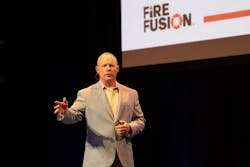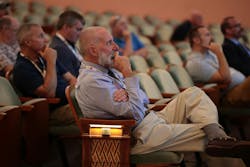FireFusion 2025: Military Leadership Principles for Today's Fire Officers
At FireFusion 2025, the theme was technology and innovations and how they are playing a key a role in the fire service, but Col. Thomas Gordon's address shifted the spotlight from technology to people.
“You mange things. You manage technology. You lead people,” said Gordon, who serves as Commandant of Cadets at The Citadel.
Inspired by his book, “Marine Maxims: Turing Leadership Principles Into Practice,” Gordon shared personal stories and lessons learned from his 30 years in the U.S. Marine Corps and adapted them to today’s fire service.
Gordon began writing his book when he started in Marine Corps by journaling any time he had good or bad experience with a leader to remind himself of who he wanted to become when he was inserted into a leadership role. After his time in the service, he had more entries about the good but learned far more from the bad.
He shared his definition of leadership: "The ability to inspire other to find the will and the way to accomplish the mission."
Know thyself
This was the first maxim that Gordon shared. You must be the number one priority before getting into leadership roles because it’s impossible to manage the emotions of others, if you are in tune with yours.
He shared a strategy that he does as Commandant of Cadets, where he makes his cadets go home and answer the question, "who are you?" The next day, he would challenge them to go home and answer who they actually were. He wanted to challenge the cadets to identify who they said they were versus who they thought they were.
"There's a chapter in my book about knowing your blind spots and making sure that you're surrounding yourself with truth," said Gordon. "The truth is that, knowing yourself also helps you align your normal compass."
It's not about you
The second maxim Gordon shared was focused on when you get into that leadership role. He mentions that the price of leadership is self-interest. To this point, someone cared about your achievements or physical appearance, but as soon you become commissioned, that all goes away, he said.
“Once you are in command, once you're in charge, the only thing that matters is the welfare of your people, the performance of your people. Your individual attributes really don't matter,” said Gordon.
It’s not about how much you know, it’s about how much you care
This maxim is where Gordon spent the most time discussing. He shared the strategies that he employs, showing how much you care can start a domino effect of pushing people in the right direction.
The first strategy is rooted from Dale Carneige saying, “Nothing sounds so sweet to a man more than the sound of his own name.” He took that and implemented that into his own life by writing down the names of the people within his organizations.
That way, when he had that chance communication with a young lieutenant, he’d address them by their first name, ask about their spouse or make a reference to a sports team they were a fan of. That gave that lieutenant the thought of his boss knowing who they are and that they must be doing something right.
“If your people think that you truly care about them, there is absolutely nothing that they won't do for the organization,” said Gordon.
Another strategy he uses to show people he cares is what he calls “letter bombs.” He would see someone working hard, write down their name, find out who their parents were and would write a short letter to them thanking them for their support.
He would give it a "96-hour fuse:" 48 hours for delivery, 24 hours for the parent to read the letter and call their kid about it. Then, 24 hours for that call to show in that person's work.
“Whatever they were doing four days ago, they are now doing it 10 times better, 10 times faster. They are dragging a whole team with them. What did it cost? Five to 10 minutes and a 49-cent stamp."
Bad things can and will happen to good units
The last maxim that Gordon shared was a story from his time in the Marine Corps when Major General Roger B. Turner exemplified unrivaled leadership.
Major General Turner’s team encountered 35 Taliban that were going to attack. They had the intel and dropped a bomb on the incoming attack. After the dust settled, it showed that those 35 Taliban were Afghan National Police.
“When the call came in, I heard Roger talking to the Commonwealth. It was all I,” he recalled. “I approved of this mission. I did this. I'm responsible for this. Roger understood that fault is past tense, responsibility is present tense, and before he even knew what happened, he was taking responsibility for everything that happened.”
Do right and fear no man
After spotlighting those maxims, he talked about his own leadership philosophy that is required to be published by the Marine Corps. His was, “Do right and fear no man.”
The emphasis was on how important integrity is, that if you have integrity that is all that matters, but if you don’t, that is also all that matters. He wants those under him to trust their gut and let their commanders know you trust theirs. Having the confidence to deviate is crucial in the exploration and development of leadership.
“I was communicating to my Marines that we should do what we ought to do, and each one of us know what that is. We know what we ought to do. I believe leadership by fear of intimidation isn’t leadership at all. I wanted my Marines to know that they should never fear the consequences of well-intentioned failure.”
Col. Gordon’s time on stage was riveting and showed the audience that he cared about what he was doing and the message he was trying to give. Even at a conference about technology, his message broke things down to the studs.
“The most valuable thing in the organization is the Marines,” said Col. Gordon. “Not the aircraft, not the tank and not the ship. It's how we take care of our people.”
About the Author
Ryan Baker
Associate Editor
Ryan Baker is a writer and associate editor with prior experiences in online and print production. Ryan is an associate editor for Firehouse with a master's degree in sciences of communication from the University of Wisconsin-Whitewater. He recently completed a year of teaching Intro to Public Speaking at UW-Whitewater, as part of his graduate program. Ryan acquired his bachelor's degree in journalism in 2023 from UW-Whitewater, and operates currently out of Minneapolis, MN. Baker, also writes freelances for the Ultimate Frisbee Association (UFA) in his free time, while also umpiring baseball for various ages across the Twin Cities Metro Area.


